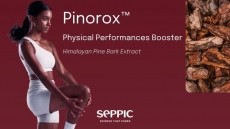Vitamin D may ease exercise-related muscle damage: Animal data

Lab animals subjected to high-intensity exercise showed significantly increased activity of the enzymes creatine kinase (CK) and lactate dehydrogenase (LDH), both are well-known biomarkers of muscle tissue damage. However, these increases were attenuated when animals were supplemented with vitamin D, report researchers in the journal Cytokine.
Vitamin D supplementation was also associated with significant reductions in levels of a number of markers of inflammation, report researchers from Kyung Hee University and the Taeneung National Training Center of Korean Olympic Committee in South Korea.
“Therefore, the supplementation with vitamin D3 may be beneficial in the rapid recovery or in protecting muscle damage from consistent training,” they wrote.
While the Food and Drug Administration (FDA) frowns upon general inflammation-related structure function claims, claims related to symptoms associated with non-disease stages, which include muscle pain following exercise.
Study details
The South Korean researchers divided lab animals into three groups: The first group were kept under sedentary conditions, and the second and third groups were subjected to high-intensity exercise. The third group also received supplemental vitamin D (1,000 IU/kg body weight).
Results of the eight week study indicated that the high intensity exercise group without vitamin D displayed increased activity of CK and LDH, but these increases were significantly lower when the rats also received vitamin D.
In addition, increases seen in the exercise-only group for markers of inflammation, including interleukin-6 (IL-6) and tumor necrosis factor-alpha (TNF-alpha), were diminished when the exercising rats also received vitamin D, said the researchers.
“In this study, we focused in comparison of muscle fiber types, soleus and the medial gastrocnemius muscle,” they explained. “
“Soleus muscle, as a slow twitch, which is predominantly composed of mitochondria-rich type I fibers and mainly uses oxidative metabolism for energy production, whereas the medial gastrocnemius muscle, as a mixed twitch, is composed of mixed type I and II fibers and has a lower volume of mitochondria.”
The lab rat data also indicated that the protein expression of vitamin D receptor (VDR) was highly increased in the muscles of the animals subjected to high-intensity exercise and vitamin D supplementation.
“The existence of the VDR in skeletal muscles is controversial,” they said. “[…] our data demonstrate the existence of the VDR protein in both the soleus and gastrocnemius muscle of rats.”
“Therefore, we concluded that vitamin D may play a pivotal role in exercise-induced muscle damage and inflammation through [modulations involving the] VDR.”
Source: Cytokine
Published online ahead of print, doi: 10.1016/j.cyto.2013.03.018
“Vitamin D3 supplementation modulates inflammatory responses from the muscle damage induced by high-intensity exercise in SD rats”
Authors: Choi M, Park H, Cho S, Lee M.
















